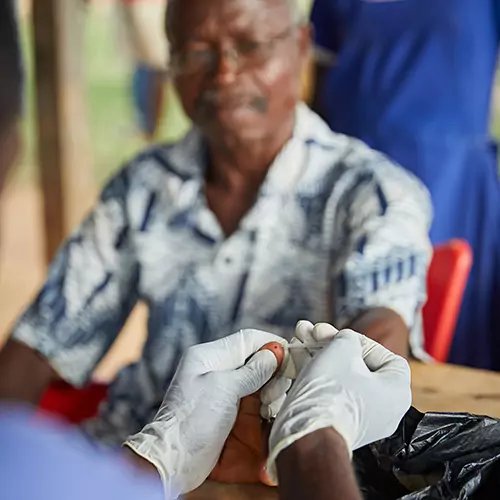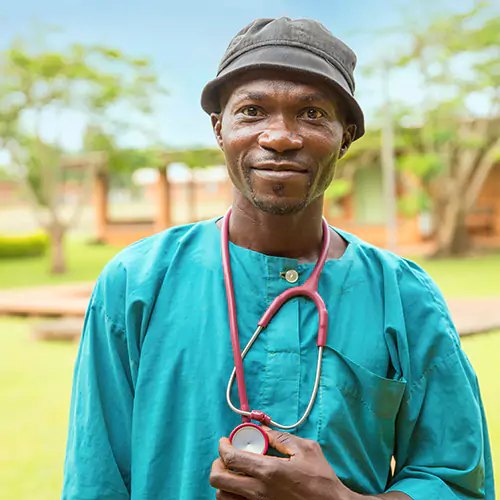Many crops are grown in poor, remote rural areas where access to clean water, health facilities and sanitation is limited. This can be extremely detrimental for the health and wellbeing of farming communities.
Nutrition and health are the focus of UN Sustainable Development Goals 2 and 3, which aim to make good health, nutrition and zero hunger a reality for all.
Our initiatives include:
Ensuring our employees have access to enough safe sources of food, water and sanitation during working hours
Running the Healthy Living Campaign to reach communities with campaigns on health and nutrition
Promoting crop diversification to farmers to improve food and nutrition security
Mobile medical screenings in rural areas
Manufacturing and retailing fortified dairy products for consumers in African markets
Supporting manufacturing customers globally to reduce salt, fat and sugar through ingredients solutions
Supporting communities through the COVID-19 pandemic
Goals and Progress
We report on the goals and targets in the Human and Social Capital sections of our 2020 Annual Report.
As with many social change initiatives, we cannot achieve progress at scale in isolation. So, we work with other initiatives and partners such as:
Chatham House: the business case for investment in nutrition
The END Fund – Neglected Tropical Diseases
The Power of Nutrition
Swiss Tropical Public Health Institute
Red Cross Society of Côte d’Ivoire
Monitoring through AtSource
AtSource+ allows customers to track a number of social and health metrics in the supply chain including:
Percentage of farmer households with access to healthcare facilities
Percentage of farmer households with access to clean drinking water and sanitation
Percentage of farmer households that are food secure, using the MAHFP methodology
Number of beneficiaries from health infrastructure and equipment. For example, the construction and renovation of clinics, water-wells and sanitary facilities
Number of beneficiaries receiving healthcare services, including medicines, health check-ups, HIV testing, community health workers, hospitals and mobile medical screenings
Number of beneficiaries attending health sensitisation or training on issues like chronic disease prevention and management
Number of beneficiaries receiving nutrition support such as support for healthy eating, and micronutrient fortification
A simple way to save lives
Improving disease and illness detection and treatment in Egypt’s farming communities
AtSource+ metrics to track progress:
- Farmer households with access to healthcare facilities
- Beneficiaries receiving healthcare services (provided and supported by ofi)
- Farmer households with access to clean drinking water and sanitation (%)
- Beneficiaries attending health sensitization/ training
- Farmer households that are food secure
Behind almost every plate of food is the work of many farmers. Many of these farmers work in remote rural areas of emerging countries, and each have their own unique health challenges.
In Egypt, rates of hypertension and diabetes are among the highest of any nation in the world. ofi responded with a health campaign in the Western Desert region to offer check-ups and hygiene training to local farmers and their farmhands. AtSource+ helps to track the impact of the program by monitoring the number of farmers who have received the training and the number of households with access to healthcare, sanitation facilities and clean water.
Around 40 farmers and labor hands have made use of this service so far and have received specific recommendations on how to manage or treat any diagnosed risks. Ashraf Ibrahim, a truck driver on an onion farm, is one of those who have benefited: “I never had a health check-up in my life. But thanks to this campaign, I'm aware that I may have diabetes which, if not controlled, may have cost me my ability to feed my family, or even my life.”
Read ofi news
While global food supply chains may be starting to heal from the COVID-19 pandemic, food and agri-business Olam International underlines the importance of addressing the long-term wellness and operational resilience needs of those small-scale farmers in emerging markets who provide much of the world’s ingredients and raw materials.
Pastors in Papua New Guinea are on a mission to help keep coffee farmers and their communities shielded from the coronavirus.
The countries where cashew is produced face high rates of malnutrition, with many farming households unable to eat healthily themselves. We set out to better understand the situation of the cashew households in Olam’s sourcing network; what kind of food they typically eat and if it is enough to meet their food and nutrition needs year-round.
By Clara Tessler, Nutrition & Health Manager, ofi
Malnutrition and poor health around the world continue to negatively impact businesses as result of working days lost to illness and reduced workforce productivity.
- Transparency in Coverage
- Modern Slavery Statement
- CA Supply Chain Transparency Act
- Transparency in Coverage
- Modern Slavery Statement
- CA Supply Chain Transparency Act
Copyright © 2024
Olam International Limited. All Rights Reserved. Co Reg No: 199504676H





